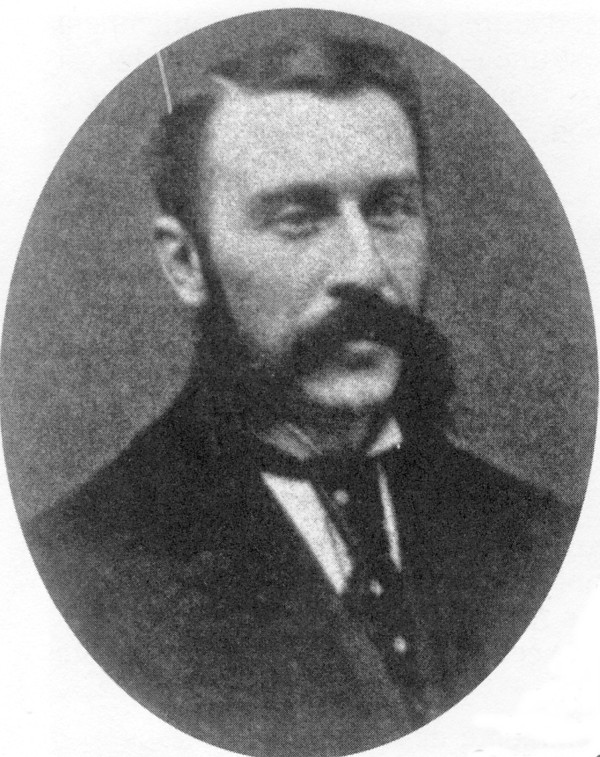
Source: Courtesy of Wikimedia Commons
BLANCHARD, THÉOTIME, teacher, jp, politician, and office holder; b. 8 May 1844 in Caraquet, N.B., son of Agapit Blanchard and Anne-Marie Poirier; grandson of Tranquille Blanchard*; m. 4 March 1867 Marie Gauvin in Caraquet, and they had three sons and a daughter; d. 11 March 1911 in Bathurst, N.B.
The son of a prosperous farmer and fisherman, Théotime Blanchard attended the Caraquet common school and then learned English, living with an uncle at Neguac. Having obtained a third-class teacher’s licence he taught in Neguac in 1863–65 and at Caraquet from 1865 to 1870.
In 1870 Blanchard, now a justice of the peace, was encouraged to enter politics by Robert Young*, a legislative councillor and former mha for Gloucester. They and others held a meeting in Caraquet to start a local reform party. But Blanchard ran as an Acadian, not a party man, and in June 1870 he became the first Acadian mha from Gloucester. Re-elected in 1874, he tried unsuccessfully to get notices of the Board of Works published in French. He did help local business, obtaining a public wharf in Caraquet and the incorporation of the Caraquet Railway Company. By 1875 he was involved in coastal trading himself.
Blanchard was a leading opponent of the Common Schools Act of 1871 [see George Edwin King*], objecting to the compulsory tax it imposed and its failure to fund sectarian schools. He chaired two meetings of Caraquet Acadians: one in August 1873, which called for separation of the school tax from other assessments and legitimate resistance to paying it, and one in November 1874, where parish officers were illegally elected by men not paying the tax. Those who did pay the tax called another meeting in January 1875, and the officers they elected were accepted by the majority of the justices of the peace. Blanchard did not take part in the subsequent riots in Caraquet [see Young], but he was one of the mhas who in August negotiated the compromise that enabled Catholic schools to be brought under the act [see John Sweeny*].
Blanchard then tried to get his parish officers reinstated by the assembly, and was accused there of incitement to riot. After an attempt on his life, he resigned to become inspector of weights and measures for Gloucester and Restigouche counties in 1876. He remained interested in politics, serving as municipal councillor for three years and resigning as inspector to run unsuccessfully in the provincial elections of 1882 and 1886. In 1887 he was appointed customs inspector at Caraquet, a post he held until 1892 when he was returned to the assembly as a supporter of Premier Andrew George Blair*. Again, his chief concern was a schools crisis: Bathurst Protestants had contested the right of nuns to run two local public schools. In the house he alluded to the hitherto unpublicized compromise of 1875 and supported the government’s decision to send a judge to investigate [see John James Fraser*].
In 1894 Blanchard resigned to run as a Conservative in a federal by-election. Recognized as a leader in the Catholic Mutual Benefit Association and supported by the former member, Kennedy Francis Burns*, he became the first Acadian mp from Gloucester. He supported remedial legislation in the dispute over the Manitoba schools [see Thomas Greenway*], and on this platform he defeated Onésiphore Turgeon* and Robert Young in the general election of 1896. He was, however, displaced by Turgeon in 1900. In the election of 1904 he was chosen to run only six days before nomination when the Conservative candidate withdrew. Without a schools crisis, he was uninspired: Turgeon won and Blanchard left politics.
Blanchard farmed in Caraquet until he died on 11 March 1911, shortly after suffering injuries in a vehicle accident. His two surviving sons and his wife inherited a very small estate. He had had little material reward for a lifetime supporting what he saw as the best interests of French Catholic education.
NA, RG 31, C1, 1871, Caraquet, N.B. (mfm. at PANB). PANB, RS64, A, 1911; RS115, 13/8–9; RS 149, A/4; RS538, B/1: 307. Courrier des Provinces maritimes (Bathurst, N.-B.), 1 sept. 1887; 17 mai, 6 sept. 1894; 18 juin 1896. L’Évangéline (Weymouth Bridge, N.-É.), 13 oct. 1892; 6, 13 avril 1893. Le Moniteur acadien, 13 mai 1870; 28 août 1873; 18 mars 1875; 7 févr. 1878; 19 juin 1896; 27 oct., 3 nov. 1904; 16 mars 1911. Les familles de Caraquet: dictionnaire généalogique . . . , Fidèle Thériault, compil. (Fredericton, 1985). K. F. C. MacNaughton, The development of the theory and practice of education in New Brunswick, 1784–1900: a study in historical background, ed. A. G. Bailey (Fredericton, 1947). N.B., House of Assembly, Journal, 1865–71, public accounts; 1871: 115, 207; 1874: 7, 198.
Sheila Andrew, “BLANCHARD, THÉOTIME,” in Dictionary of Canadian Biography, vol. 14, University of Toronto/Université Laval, 2003–, accessed December 1, 2024, http://www.biographi.ca/en/bio/blanchard_theotime_14E.html.
The citation above shows the format for footnotes and endnotes according to the Chicago manual of style (16th edition). Information to be used in other citation formats:
| Permalink: | http://www.biographi.ca/en/bio/blanchard_theotime_14E.html |
| Author of Article: | Sheila Andrew |
| Title of Article: | BLANCHARD, THÉOTIME |
| Publication Name: | Dictionary of Canadian Biography, vol. 14 |
| Publisher: | University of Toronto/Université Laval |
| Year of publication: | 1998 |
| Year of revision: | 1998 |
| Access Date: | December 1, 2024 |